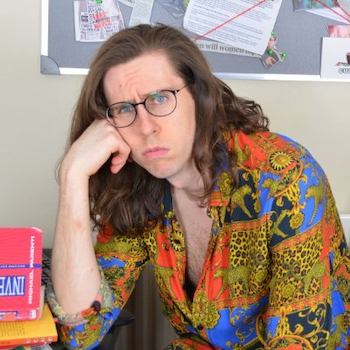
How the World of ‘Venom’ Manufactures Consent
Venom is the cinematic equivalent of a bag full of amphetamine-frenzied ferrets. It is simultaneously a by-the-numbers superhero origin story, a sinister body-horror flick, a buddy cop comedy, and a 1998 CGI-blockbuster (end-credit rap about the preceding film included). Each of these identities churns and fights in a roiling mess much like the titular alien symbiote. Somehow, in this manic mélange, there is a bit of commentary on the hold capital has over media.
Eddie Brock is an investigative journalist who’s principled, dedicated, and ruggedly handsome. His particular beat focuses on governmental and corporate corruption and their effects on society. He’s a plucky maverick guided by his own sense of justice. These principles are, regrettably, a hindrance to his journalistic career as his muckraking has even resulted in his being run out of New York City for digging too aggressively into one story.
Now in San Francisco, Brock is trying to rebuild his career when he receives an assignment from his editor to interview Carlton Drake, the CEO of the Life Foundation, billionaire, and Elon Musk-alike. The editor asks for a fluff piece on Drake’s space exploration project. Brock objects, exclaiming, “He’s a crook!” The editor immediately shuts down Brock’s cynicism, demanding that he avoids any prying questions and merely writes the fluff piece, citing the economic power and connections Drake has over the publication. Later that night Brock finds some court documents on his lawyer fiancé’s laptop that implicate Drake in the deaths of several people during his clinical trials.
During his interview with Drake, Brock levels his accusations against him, bringing the interview to an abrupt end. Brock is hauled into his editor’s office and summarily fired. ‘I can’t trust you.’ the editor explains.

Five Filters
This sequence of the film is a textbook example of how the media under capitalism purges itself of dissenting voices, allowing capital to trundle along largely unopposed. According to Noam Chomsky and Edward S. Herman in their book, Manufacturing Consent, there are five great filters that bar anti-capitalist, radical or inconvenient voices from reaching the mainstream media. They are:
- Ownership: Media companies are often part of a larger corporation that prioritizes profit over anything as pedestrian as truth. So, the publication is subservient to the profit motive of the corporation.
- Advertising: Advertising is an indispensable source of money for media companies. So if you lose your advertisers, you lose your funds. Thus, you’d do well to keep them happy.
- Sourcing: Before you can write a story, you need sources. Unfortunately, these sources are often part of the very organization (be it governmental, corporate, or the local tidy towns committee) you’re seeking to report on. If you’re too harsh, too negative, they won’t speak to you again. So to keep your access to sources, you need to behave and overlook and omit a few things that might bite a little too close to the knuckle.
- Flack: Challenging power is the equivalent of painting a big, red bull’s-eye on your chest. If your story annoys power, you’ll suddenly find that official voices come forward to discredit your sources, hand wave away your stories, and question your personal hygiene. This can be seen in pretty much every White House press conference.
- Fear: This filter uses the threat of an external enemy to cow voices of dissent and corral public opinion. A bit like how you can make children stop bickering and go to bed by scaring them with the bogeyman.
Eddie Brock falls foul of filters one and three, in particular. His publication is tied to corporate interests that want to keep Drake happy, or are even controlled by him, and his access to his main source, Drake himself, is swiftly withdrawn when he steps over the line. These filters lead to Brock losing his job and gets his name on a blacklist, ending his career and thus ensuring that another dissenting voice is purged from the media.
Ultimately, Brock’s dissent is crushed. While he does go on to find proof of Drake’s crimes, these go unreported, even though the evidence was placed on his former editor’s desk. The propaganda model is too powerful, and the editor wouldn’t have gotten to where he is by pushing against it. So, despite the fact that Drake was ultimately foiled, the public remains unaware of his transgressions.
In the end, Brock returns to journalism, however, he seems to have changed his beat. He holds an interview with a convicted serial killer (and obvious sequel foe) rather than return to his dissenting muckraking. The propaganda model was successful.

